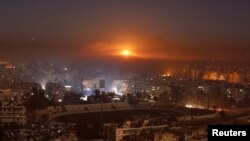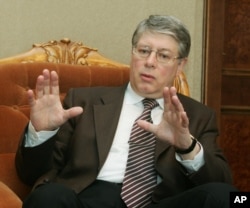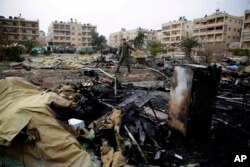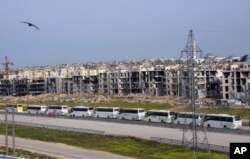Human rights groups have disputed Russian claims that Aleppo has been “liberated” from Jabhat al-Nusra (al-Qaida) terrorists and affiliated extremists, accusing Russian and Syrian forces of having bombed Syria's second largest city into submission.
In commemoration of six months after what they called the “liberation of Aleppo,” the Russian mission hosted a side event Wednesday at the United Nations Human Rights Council called “Aleppo: A City Free from Terror, New Life, New Hopes” to give its version about “what took place in the city before, during and after that event.”
Moscow has come under international criticism for its support of the regime of Syrian President Bashar al-Assad and its alliance with the Syrian air force in the relentless bombing of eastern Aleppo, which drove the rebels out of the city. Countless numbers of civilians were killed and wounded during this military action.
Russian ambassador says life changing in Aleppo
In kicking off the conference, Russian Ambassador Alexey Borodavkin said it is important that the world “know the truth about these events” and was made aware of how life is changing in Aleppo.
“We all understand and we all recall that when eastern Aleppo was being set free from al-Nusra and other radical groups, some of the world mass media, with the help of terrorist supporters, disseminated fake news online on the situation. A whole number of states and international organizations echoed and disseminated this fake news,” Borodavkin said.
To highlight the alleged duplicity of the Western media, the conference projected a live video from Aleppo of Omran Daqneesh, the young Syrian boy who became a worldwide symbol of the conflict in Syria when a photograph of his face covered in ash was flashed around the world.
On the video, a happy, healthy-looking Omran is seen sitting on the lap of his father, who criticized the media and said, “I want my son to become a symbol of peace.”
Among those participating in this event were several Russian military officials, who spoke at great length about the humanitarian work the Russian military was engaged in, such as setting up food kitchens, setting up field hospitals and providing medical services to the people of Aleppo.
They spoke about the work they were doing in revitalizing and rehabilitating the city and making it safe for displaced people to return to the homes they had fled during the conflict.
These military men never spoke about their role in the conflict. They portrayed themselves as peacemakers, as humanitarians and as liberators of Aleppo.
HRW official isn't persuaded
The Human Rights Watch communications director for the Middle East, Ahmed Benchemsi, was not persuaded by this argument.
He told VOA that the word liberation was politically loaded and that he was not sure he knew what it meant.
“That word does not sound right when thousands of civilians are bombed or starved to death by their so-called liberators,” said Benchemsi. “I mean, east Aleppo was controlled by opposition armed groups for four years and in retaliation, the Syrian government has bombed civilian neighbors, including schools and hospitals using indiscriminate weapons, and then the Russian air force joined as well. The Russians targeted civilians in indiscriminate strikes. So, these things are called violations of the laws of war, if not war crimes — not liberation.”
Terrorists blamed
The participants at the conference blamed the destruction, deaths and injuries in Aleppo on the terrorists.
No one even mentioned the airstrikes conducted by Syria and its Russian ally except for Marinella Corregia, a peace activist and researcher at No-War Network in Rome, who condemned local non-governmental organizations for feeding lies about Russia and Syria to the Western media and international non-governmental organizations.
“The allegations, which went on for years, not only months, about Syria and Russia bombing hospitals deliberately. There were also lots of allegations about bombing bakeries. Why? Why someone should bomb a bakery — to get the population against the government?"
Corregia said it was time to break this “vicious circle of lies.”
Proof of targeting medical facilities
Ravina Shamdasani, spokeswoman for the High Commissioner for human rights, told VOA that there was credible proof that hospitals and other medical facilities have been deliberately targeted.
“We have seen an unprecedented number of attacks on medical facilities — even ad hoc medical facilities and even the targeting of medical professionals who are seen to be treating people from the other side; whether they are treating people presumed to be of the opposition or people presumed to be cooperating with the Syrian forces.
“We have seen a lot of attacks,” she said. “And, yes, there is an obligation under international humanitarian law that hospitals and medical facilities have a special protected status.
“And attacking these hospitals or using them as military facilities, does constitute a war crime," she said.







